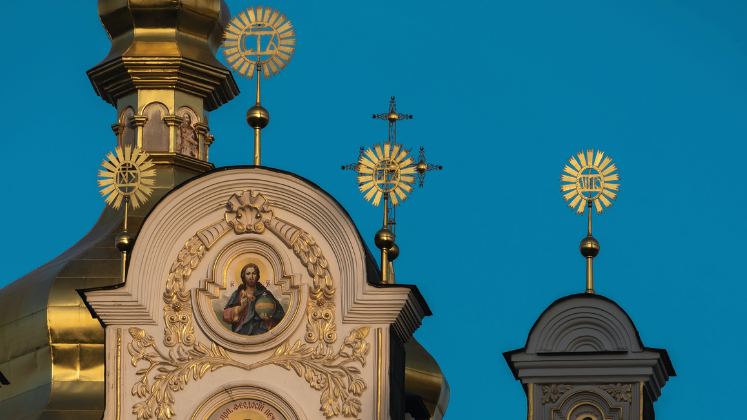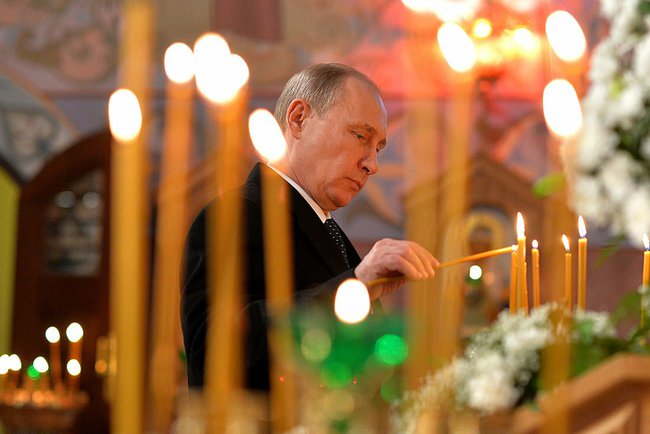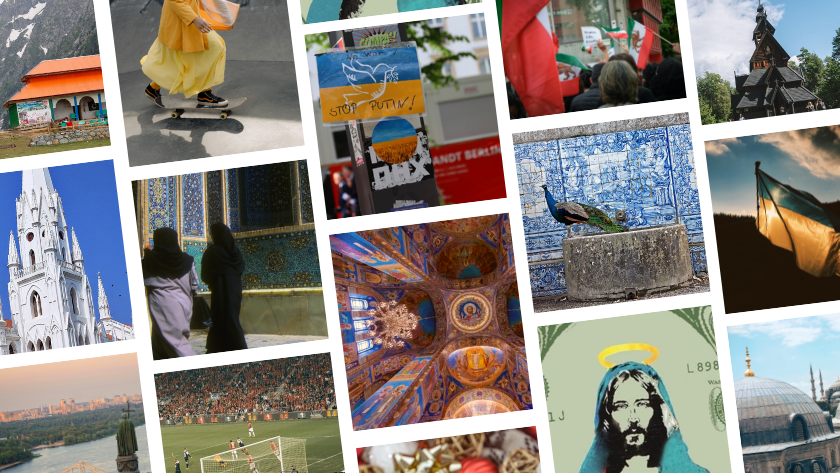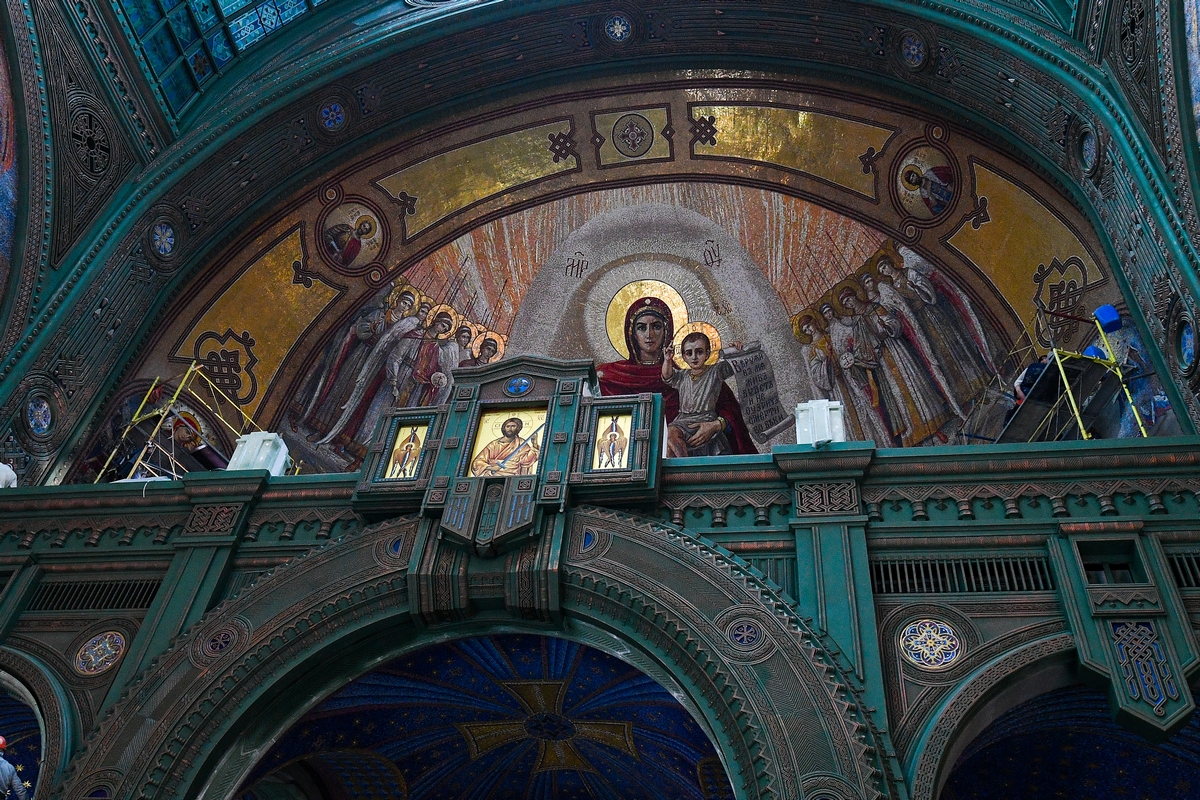As February 24th approaches, conversations about the role of religion in Russia’s invasion of Ukraine continue. Here, Lucian N. Leustean analyses the key milestones which have shaped religious mobilisation towards the ongoing war.

Russia’s invasion of Ukraine remains a religious war and requires not only political and military answers but also a religious solution.
In an op-ed published on 3 March 2022, I wrote that Russia’s invasion of Ukraine on 24 February can be described as the first religious war in the 21st century. So, to what extent is the ongoing conflict still a religious war and what are the lessons for the religious and political communities eleven months later?
Russia and Ukraine are predominantly Eastern Orthodox Christian countries, with three churches actively involved in the conflict, namely the Russian Orthodox Church, the Ukrainian Orthodox Church – Moscow Patriarchate (which separated from the Russian Orthodox Church in 1990 and remains the largest religious community in Ukraine) and an independent (autocephalous) Ukrainian Orthodox Church (recognised by the Istanbul-based Ecumenical Patriarchate only in 2019).
In chronological order, the following events have been milestones in shaping religious mobilisation towards the ongoing war:
- On 6 March, Patriarch Kirill gave a sermon in the Cathedral of Christ the Saviour in Moscow in which he provided a spiritual mission for the Russian invasion by claiming that the war was nothing other than the restoration of ‘human civilisation’. His country’s troops were fighting the West which tried to impose ‘gay parades’ on the Russian world.
- On 13 March, over 1500 scholars signed an open letter of protest decrying the ideology of the ‘Russian world’ which placed together Eastern Orthodox Christianity, political nationalism, and geopolitical ambitions.
- On 12 April, under the leadership of former Archbishop of Canterbury Rowan Williams, religious leaders representing Anglican, Catholic, Orthodox, Muslim, Buddhist, and Hindu communities in the UK travelled to Chernivtsi in support of Ukrainian refugees.
- On 27 May, Metropolitan Onufriy, head of the Holy Synod of the Ukrainian Orthodox Church – Moscow Patriarchate severed ties with the Russian Orthodox Church by decreeing ‘complete autonomy and independence’.
- On 7 June, the Moscow Patriarchate included under its full control the official jurisdiction of Ukrainian dioceses in Crimea. Metropolitan Hilarion (Alfeyev), Chairman of the Department of External Church Relations of the Moscow Patriarchate, was removed from his position and appointed Metropolitan of Budapest and Hungary.
- On 27 July, Metropolitan Epifaniy, head of the independent Ukrainian Orthodox Church, sent a letter on behalf of his Holy Synod to the Ecumenical Patriarchate asking for a pan-Orthodox review of Patriarch Kirill’s vision of a ‘Russian world’, and to ‘[deprive] him of the Patriarchal throne’.
- On 5 August, Pope Francis met Metropolitan Anthony of Volokolamsk, the newly-appointed Chairman of the Department for External Church Relations of the Moscow Patriarchate.
- On 21 August, Darya Dugina, daughter of ultranationalist philosopher Alexander Dugin, died in a car bomb in Moscow. It remains unclear if Dugin himself was the target, as he was perceived as being influential to the Kremlin ideology of Russia’s defence of Orthodox values and a Russian-led Eurasian Empire from Dublin to Vladivostok, a topic taught in Russia’s military universities.
- On 26 September, Patriarch Kirill supported military mobilisation by stating that Russian ‘soldiers dying in Ukraine would be cleansed of their sins’.
- On 17 October, Father Ioan Sauca, acting general secretary of the World Council of Churches, met Patriarch Kirill in Moscow both stating that ‘the war cannot be holy’.
- Between 23 and 25 October, under the title the ‘Cry for Peace’, the Sant’ Egidio Community organised an international gathering of religious leaders representing all major world religions in Rome, with Pope Francis declaring a day of prayer for Ukraine.
- On 9 November, President Putin signed the decree ‘On approving the fundamentals of state policy for the preservation and strengthening of traditional Russian spiritual and moral values’.
- On 23 November, the Ukrainian security services carried out raids at Orthodox monasteries affiliated with the Ukrainian Orthodox Church – Moscow Patriarchate.
- On 30 November, the Archbishop of Canterbury Justin Welby and the Rt Revd Dr Robert Innes, the Anglican Bishop in Europe, visited Kyiv in support of the refugees and displaced people.
- On 1 December, President Zelensky proclaimed five legal measures aimed at ensuring ‘Ukraine’s spiritual independence’ from Russia.
- On 25 December, in his Urbi et Orbi, Pope Francis decried the war by stating that ‘Our time is experiencing a grave famine of peace’.
- On 25 December, several religious congregations under the independent Ukrainian Orthodox Church celebrated Christmas. The Holy Synod of the Ukrainian Orthodox Church decreed that the new date should be imposed due to the ‘need to implement calendar changes in the near future.’ Metropolitan Epifaniy, head of the Orthodox Church of Ukraine, and Metropolitan Svyatoslav, head of the Ukrainian Greek Catholic Church, decided to meet and discuss calendar changes across the country.
- On 28 December, 13 clergy of the Ukrainian Orthodox Church – Moscow Patriarchate had their citizenship revoked.
- On 5 January 2023, an appeal to ‘ceasefire’ appears on the official website of the Moscow Patriarchate. A few hours later, President Putin issued a similar statement. The Ukrainian political authorities rejected the statements as examples of ‘hypocrisy’.
- On 7 January, for the first time, Metropolitan Epifaniy of the Ukrainian Orthodox Church celebrated Christmas at Kyiv Pechersk Lavra, one of the most important religious sites in Ukraine. The Lavra was divided into two, with the Upper section handed over to the Ukrainian Orthodox Church while the Lower Lavra remained under the Ukrainian Orthodox Church – Moscow Patriarchate.
- On 9 January, in his address to members of the diplomatic corps, Pope Francis made reference to Ukraine by reiterating the 1965 Pastoral Constitution Gaudium et Spes which stated that ‘every act of war directed [at] the indiscriminate destruction of whole cities or vast areas with their inhabitants is a crime against God and humanity which merits firm and unequivocal condemnation’.
- On 18 January, Metropolitan Anthony of Volokolamsk, Chairman of the Department for External Church Relations of the Moscow Patriarchate, joined remotely a meeting of the UN Security Council to draw attention of ‘the unlawful actions of the Ukrainian state authorities with regard to the largest confession of the country’.
- On 25 January, Pope Francis welcomed a delegation of the All-Ukrainian Council of Churches and Religious Organisations, representing Christian, Muslim and Jewish communities. For the first time, Pope Francis met Metropolitan Epifaniy of the Ukrainian Orthodox Church. Metropolitan Onufriy of the Ukrainian Orthodox Church – Moscow Patriarchate refused to attend the meeting and sent instead a lower ranking clergy to represent his Church.
- On 27 January, the State Service of Ukraine for Ethnopolitics and Freedom of Conscience published a map with 307 religious buildings destroyed or damaged by Russia’s invasion since February 2022.
This list is non-exhaustive and does not include the suffering and trauma caused by the war to the lives of so many people. Transfer of parishes between the two Ukrainian churches, changes in religious jurisdiction, the work of military chaplains on both sides of the conflict, the bombing of churches and religious sites, and the humanitarian activities of religious communities towards refugees and displaced people are some of the missing examples from the overall picture.
What are the lessons for understanding the religious dimension of the ongoing war? Three key points stand out:
First, religion has been an inexorably active part of the war and its security strategies in advancing political power. The longer the war continues the more complex the religious mobilisation will become. In Russia, Patriarch Kirill’s statements only reinforce the militarisation of Russian society in support of the war, a discourse adopted by Putin’s inner circle and the security apparatus. In Ukraine, in the legislative process of implementing religious freedom and ‘spiritual independence’ from Russia, political authorities need support from international organisations to ensure that religion is not used as a tool leading to further military escalation.
Second, the politicisation of religion has demonstrated that the shifting frontline between Russian and Ukrainian troops can be seen as a religious border. Military chaplains fighting alongside Russian troops do not hesitate to describe the conflict as a veritable ‘spiritual war’. Ukrainian troops defend not only their country but the whole secular West and the liberal Eastern Orthodox world while the Russians fight for the protection of traditional Orthodox Christianity.
Third, political imagination and identifying a diplomatic and military solution to ending the conflict must take the multifaceted role of religion into account. Religious diplomacy, informal faith-based networks of national and international dialogue, religious symbolism, and religious charisma could provide results where political and military avenues are unable to do so.
The social and political mobilisation of religious communities in Russia and Ukraine will only continue to intensify in the months ahead and will remain key to understanding what motivates people and states.
Religion, in its institutionalised form and as a lived community, can increase conflict but can also provide the means of discovering peaceful solutions.
This op-ed was supported by the author’s participation as Senior Fellow in the ‘Orthodoxy and Human Rights’ project, sponsored by Fordham University’s Orthodox Christian Studies Center, and generously funded by the Henry Luce Foundation and Leadership 100.
Note: This piece gives the views of the author, and not the position of the LSE Religion and Global Society blog, nor of the London School of Economics.
Photo by Viktor Hesse on Unsplash






1 Comments